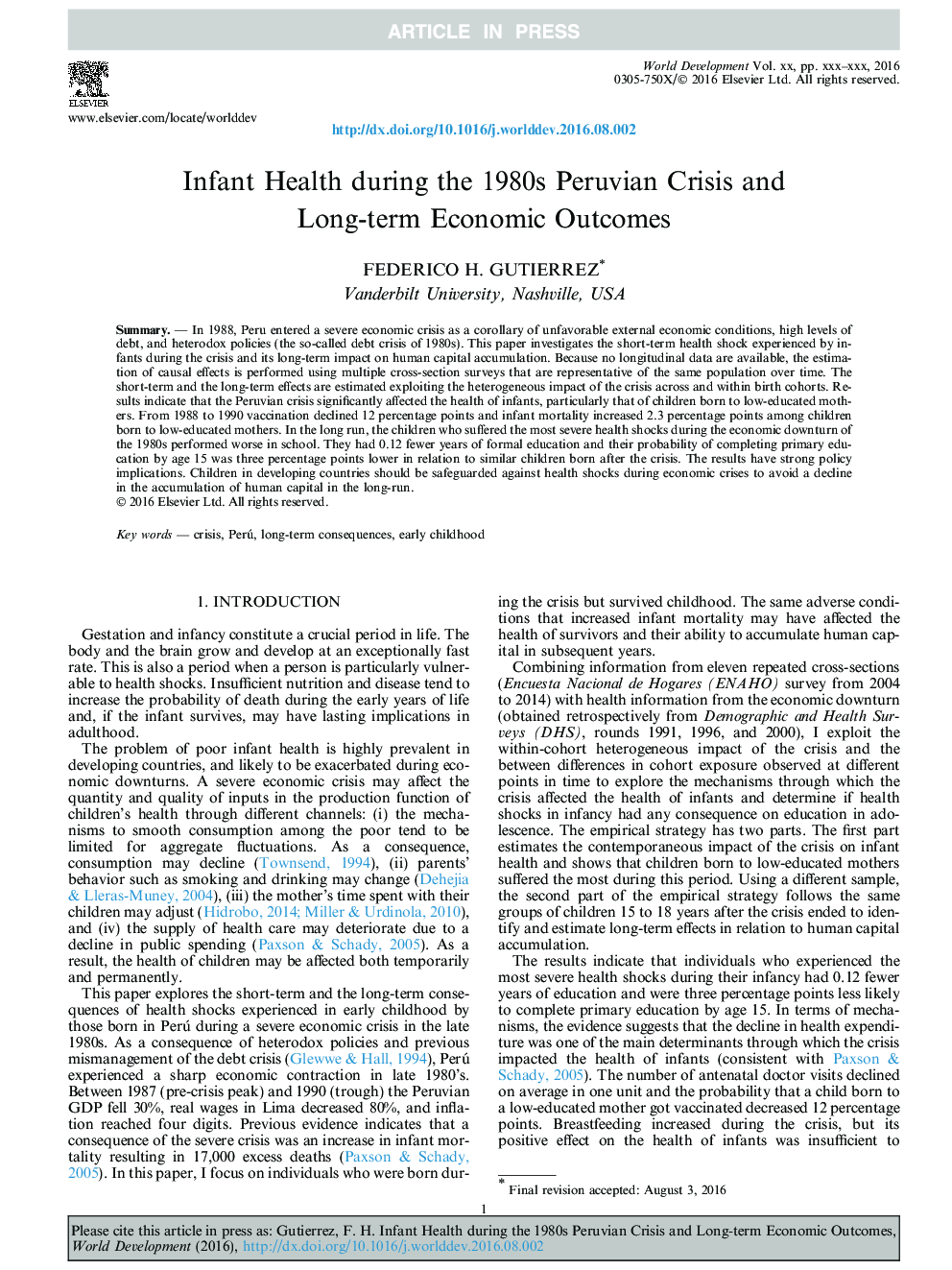| کد مقاله | کد نشریه | سال انتشار | مقاله انگلیسی | نسخه تمام متن |
|---|---|---|---|---|
| 5105344 | 1481129 | 2017 | 17 صفحه PDF | دانلود رایگان |
عنوان انگلیسی مقاله ISI
Infant Health during the 1980s Peruvian Crisis and Long-term Economic Outcomes
ترجمه فارسی عنوان
سلامت نوزاد در دهه 1980 بحران پرو و نتایج اقتصادی بلند مدت
دانلود مقاله + سفارش ترجمه
دانلود مقاله ISI انگلیسی
رایگان برای ایرانیان
کلمات کلیدی
ترجمه چکیده
در سال 1988، پرو وارد بحران شدید اقتصادی به عنوان یک نتیجه از شرایط نامساعد اقتصادی خارجی، سطوح بالای بدهی و سیاست های ناهماهنگی (بحران بدهی های دهه 1980) شد. در این مقاله شواهدی پیرامون سلامت نوزادان در طول بحران و تأثیر آن در تأثیرات بلندمدت بر انباشت سرمایه انسانی بررسی شده است. از آنجا که هیچ داده طولی در دسترس نیست، برآورد اثرات علمی با استفاده از چندین مقیاس های مختلف انجام می شود که نمایانگر همان جمعیت در طول زمان است. اثرات کوتاه مدت و بلندمدت برآورد شده و از تاثیرات ناهمگون بحران در سراسر و در داخل گروه های تولد برآورد شده است. نتایج نشان می دهد که بحران پرو به طور قابل توجهی بر سلامت نوزادان، به ویژه کودکان مبتلا به مادران با تحصیلات پایین، تأثیر می گذارد. از سال 1988 تا 1990 واکسیناسیون 12 درصد کاهش یافت و مرگ و میر نوزادان در میان کودکان متولد شده از مادران کم تحصیل 2.3 درصد افزایش یافته است. در دراز مدت کودکانی که در طول رکود اقتصادی دهه 1980 به شدت تحت تأثیر شوک های سلامتی قرار گرفته اند، در مدرسه بدتر شده اند. آنها دارای دوره های رسمی تحصیلی 0.12 ساله بودند و احتمال داشتن تحصیلات ابتدایی تا سن 15 سالگی در مقایسه با کودکان مشابه پس از بحران، سه درصد کمتر بود. نتایج حاصل از پیامدهای سیاست قوی است. کودکان در کشورهای در حال توسعه باید در برابر بحران های اقتصادی در برابر بحران های اقتصادی محافظت شوند تا مانع انباشت سرمایه انسانی در بلندمدت شود.
موضوعات مرتبط
علوم انسانی و اجتماعی
اقتصاد، اقتصادسنجی و امور مالی
اقتصاد و اقتصادسنجی
چکیده انگلیسی
In 1988, Peru entered a severe economic crisis as a corollary of unfavorable external economic conditions, high levels of debt, and heterodox policies (the so-called debt crisis of 1980s). This paper investigates the short-term health shock experienced by infants during the crisis and its long-term impact on human capital accumulation. Because no longitudinal data are available, the estimation of causal effects is performed using multiple cross-section surveys that are representative of the same population over time. The short-term and the long-term effects are estimated exploiting the heterogeneous impact of the crisis across and within birth cohorts. Results indicate that the Peruvian crisis significantly affected the health of infants, particularly that of children born to low-educated mothers. From 1988 to 1990 vaccination declined 12 percentage points and infant mortality increased 2.3 percentage points among children born to low-educated mothers. In the long run, the children who suffered the most severe health shocks during the economic downturn of the 1980s performed worse in school. They had 0.12 fewer years of formal education and their probability of completing primary education by age 15 was three percentage points lower in relation to similar children born after the crisis. The results have strong policy implications. Children in developing countries should be safeguarded against health shocks during economic crises to avoid a decline in the accumulation of human capital in the long-run.
ناشر
Database: Elsevier - ScienceDirect (ساینس دایرکت)
Journal: World Development - Volume 89, January 2017, Pages 71-87
Journal: World Development - Volume 89, January 2017, Pages 71-87
نویسندگان
Federico H. Gutierrez,
